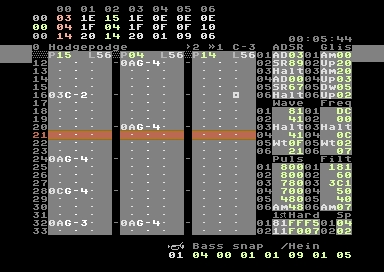

I suspect also that repeatedly writing into D4xx unchanged/unused values that you're copying from ghost registers could cause problems. Trust me, ask your artists - they can hear the difference. my hopeful solution is that GT2 could write to both ghostregs and D4xx and, hopefully, the music will still sound correct. I use this version for the visualiser.Įxpensive in memory and CPU to do this way as you'll appreciate. another copy at $3000-4fff that writes to ghostregs. one copy of the tune at $1000-2fff that plays music as usual, writing to D4xx I'm reliably informed by our musicians that it doesn't sound the same.įor a 1x tune, I can keep everyone happy:. That's what I already do (with a reverse copy to D4xx from D418 to D400). I think he wants to know the written values for visualization purposes :) But indeed, using ghostregs and copying them to SID in your IRQ is the solution :) Raitlin: What do you want to achieve? And why is using either option and copying memory to SID yourself not an option?
You can enable the buffered writes in GT2 when exporting the tune, then just copy from the zp or the buffer mem to sid. one that's used to Visual Studio / C++ etc.).
i need in order for GT to compile for me :'( (yeah, I'm a Windows user. but I have no idea what configuration of MinGW/GCC/. I believe that GT will allow either of these options. and wondered if somebody could help?īasically, what I'd like is to be able to have tunes output from GT that write to -both- ghost registers -and- D4xx.
#Goattracker windows how to#
I couldn't figure out how to get GT to compile. can someone add a feature for me?įorums > C64 Coding > Goattracker.


 0 kommentar(er)
0 kommentar(er)
